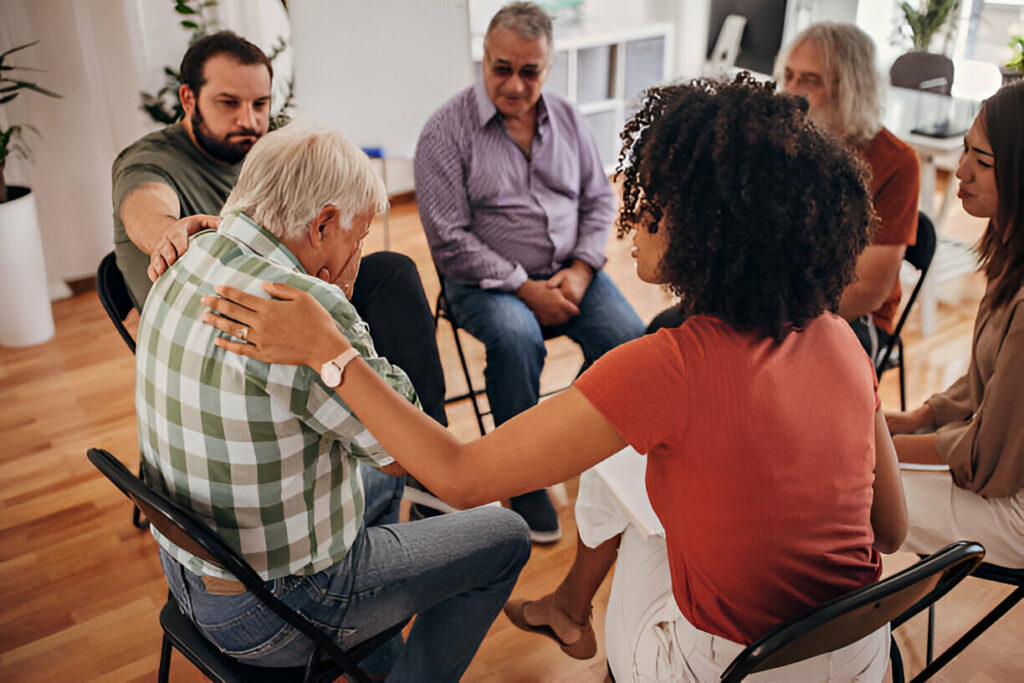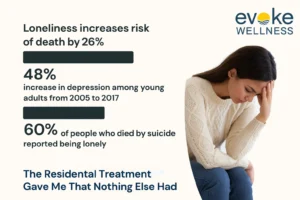I didn’t want to die. But I didn’t really want to live, either.
It wasn’t a crisis. It was quiet. I’d wake up, go through the motions, smile when I had to. Inside, though, I was disappearing.
There’s a name for that kind of pain. But I didn’t have the words for it yet. I only knew that I was tired in a way sleep couldn’t fix. And scared in a way that didn’t show.
I didn’t expect residential treatment to change everything. I just knew something had to give.
Here’s what it was like to find my voice again—after almost losing it for good.
The Loneliness of Looking “Fine”
People say “check on your strong friends,” but I didn’t even look strong. I just looked normal. That was the scariest part.
I could work a shift, send an email, make a joke. I had people who loved me. A roof over my head. From the outside, I had no excuse to be unraveling.
So I kept quiet. Because how do you explain that the hardest part of your day is just existing?
It wasn’t that I wanted to end my life. It’s that living didn’t feel like something I could keep doing. Not like this.
The Moment I Realized I Couldn’t Keep Hiding
There wasn’t a dramatic breaking point. No emergency room. No intervention.
It was a Tuesday.
I was in the grocery store, standing in front of a shelf of cereal, and I couldn’t make a decision. Not because I didn’t care—but because nothing mattered.
That scared me more than anything else had.
I went home and started looking for help—not because I thought it would fix me, but because I was scared I’d go completely numb if I didn’t try something.
I found the residential treatment program at Evoke Wellness Ohio. And for the first time, I didn’t feel talked down to. I didn’t feel like I had to convince them I was “sick enough.” It felt like someone had written it for me.
What I Thought Treatment Would Be (and What It Actually Was)
I assumed residential care meant locked doors, clinical halls, and people watching my every move.
But when I arrived, I was met with warmth. Not performative pep—but quiet, patient care. The kind where no one expects you to smile, but they’ll still hand you a cup of tea and ask if you slept.
The space was calm. The structure was grounding. There were rules, yes, but they weren’t harsh. They made me feel held.
I didn’t have to share my story right away. I didn’t have to perform wellness. I could just be. And for the first time in months, I wasn’t alone in it.
The First Time I Told the Truth Out Loud
It happened in group.
Someone else said something I had never dared say myself:
“I don’t want to die. But I don’t know how to keep living like this.”
My throat burned. My hands shook. But when I spoke, it came out:
“Same. That’s exactly it.”
And no one flinched. No one panicked. They just nodded. A few people even smiled—like they were relieved someone else had said it, too.
That moment cracked something open in me. I’d been holding in so much silence. And suddenly, it wasn’t just mine anymore.
What Residential Treatment Gave Me That Nothing Else Had
I’d tried outpatient therapy. Medication. Journaling. Advice from friends. And all of it helped, a little. But nothing stuck. Nothing gave me enough distance from my everyday to really feel anything shift.
Residential treatment gave me:
- Space from my triggers
- Structure that didn’t feel punishing
- Staff who knew how to sit with pain—not fix it
- People who got it
There were no miracle moments. No cinematic breakthroughs. But little by little, I started to come back to myself.
I remembered things I used to love. I started sleeping again. I laughed—genuinely, not out of politeness.
And I realized: maybe I didn’t have to be “happy” to want to stay. Maybe I just needed to feel real again.
You Don’t Have to Be in Crisis to Deserve Care
That’s what I want you to hear, if nothing else.
You don’t need to be bleeding to go to the hospital. You don’t need to be actively suicidal to get help.
If you are surviving, but barely—if you’re tired, numb, and aching in a way you can’t explain—that’s enough.
Residential treatment is for people like us, too. Not just the ones in obvious crisis, but the quiet sufferers. The ones who answer, “I’m fine,” even when we’re not.
You don’t have to keep pretending.
I’m Still Here. And That Means Something.
This isn’t a before-and-after story. I still have hard days. Sometimes I still go quiet. But now, I know I have tools. I have people. I have me.
I know how to ask for help.
I know that numbness is a symptom—not a personality trait.
I know that silence doesn’t mean hopelessness. It just means it’s time to listen a little closer.
And I know that if I ever get to that place again, I’m not alone. Because there are places—like Evoke—where people understand what it means to want to live, even when it hurts.
FAQs: Residential Treatment for Suicidal Thoughts (Without Crisis)
Do I have to be actively suicidal to go to residential treatment?
No. Residential treatment is for anyone struggling with mental health, including those who feel emotionally exhausted, numb, or disconnected—but aren’t in acute crisis.
What happens during residential treatment?
You’ll live in a safe, supportive environment with structured therapy, rest, holistic care, and time to heal. You’ll have access to individual counseling, groups, and wellness activities.
Will I be judged for not having a “big” reason to be here?
Not at all. Pain is pain. Our team at Evoke understands that quiet suffering can be just as urgent as obvious crisis. You will be met with care, not comparison.
Is this just for people with addiction?
While Evoke Wellness treats both substance use and mental health issues, you do not need to be using substances to access care. Depression, anxiety, trauma, and suicidal thoughts are all valid reasons to seek help.
What if I’ve never done treatment before?
That’s okay. Many people start with residential care because it offers space to reset, reflect, and learn new tools. No prior experience is required.
You’re Not Broken. You’re Just Hurting.
And hurt deserves care.
You don’t need to prove your pain to deserve support. You don’t need a dramatic moment. You just need one small, quiet willingness to try.
Call (866)430-9267 or visit our residential treatment program in Hilliard, Ohio to take that first step. You’re not alone in this—and you don’t have to find your voice all at once. We’ll help you carry it until you can.



